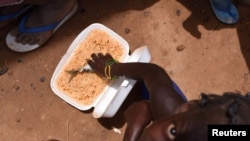The World Food Organization warns the humanitarian crisis in Africa's Sahel region is growing, while the world pays scant attention to this unfolding tragedy.
Conflict and hunger are leading to sharp levels of displacement in Burkina Faso, Mali and Niger as people flee their homes in search of safety and something to eat.
The U.N. World Food Program reports more than 860,000 people are internally displaced across the three Sahelian countries, while they are hosting more than 270,000 refugees from other countries.
WFP spokesman Herve Verhoosel said 20 million people living in conflict-affected areas are bearing the brunt of this looming hunger and malnutrition crisis.
“The conflict is devastating, devastating for agriculture, for rural economies, and almost one in three children is out of school in many conflict-affected areas in those three countries. This year, more than 2.4 million people require urgent food and nutrition assistance in Burkina Faso, Mali and Niger,” he said.
Burkina Faso is the worst hit country in the region. WFP Country Director David Bulman said malnutrition rates among displaced people in some areas are 19.7 percent. He said the U.N. considers 15 percent to be an emergency level.
On a phone line from Rome, he told VOA climate change is making the population more vulnerable. He said Burkina Faso only has one rainy season from May to September in which farmers can plant and grow their crops.
“With the climate evolution, that rainy season has become a little bit shorter. Fortunately, this last rainy season was quite good. So, the overall crop is good. But in the areas of insecurity, people have not been able to carry on their farming as normal. That has been disrupted. And, a lot of them had to abandon their crops in the field as they were displaced,” said the spokesman.
WFP reports that escalating fighting in the Central Sahel also is limiting humanitarian access to families in need.
The agency currently is providing food aid to more than 2.6 million people. But it is running out of cash at a time when emergency needs are increasing. WFP says it urgently needs more than $150 million to continue its life-saving activities.




